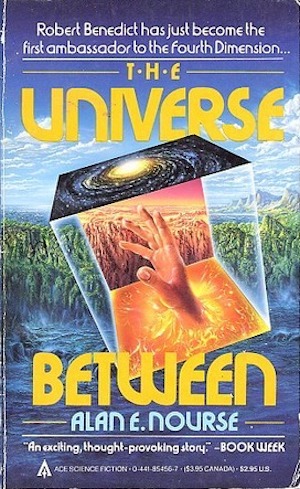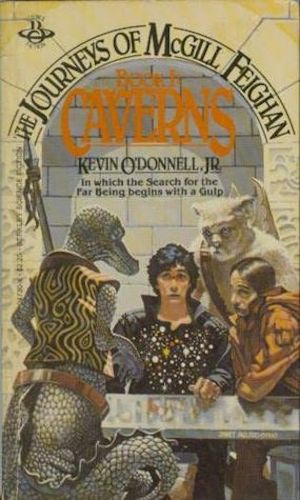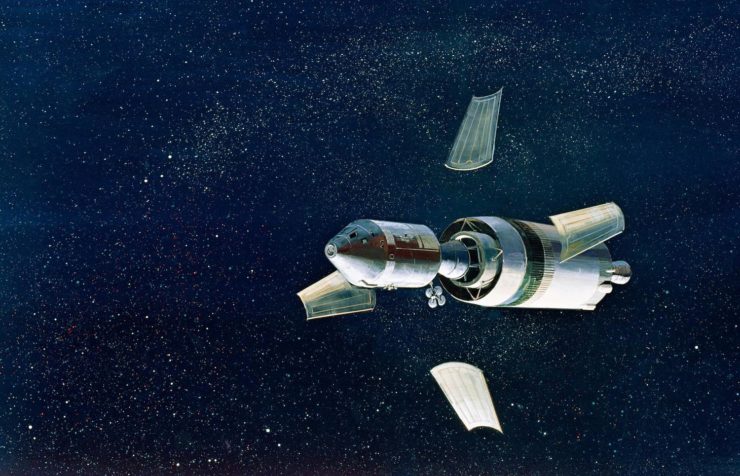The gulfs of space are vast, awesome, and highly inconvenient. Crossing them with conventional chemical rockets would take millennia. Indeed, any rocket using even halfway plausible technology seems likely to consume several human lifespans before reaching even the closest stars.1
Many authors, not wanting their characters to die of old age getting to Proxima Centauri, have abandoned plausible transport methods for the starkly implausible. Best of all? Techniques that allow travellers to step directly from one world to another without the bother of dealing with the intervening distance. The novels and series below feature five such methods.
The Universe Between by Alan E. Nourse (1965)

Little is known of the odd hypercube-type thing that has appeared as a result of advanced cryogenics research except that trying to determine its nature killed three brilliant men and sent two more to the asylum. The best men having failed, Dr. McEvoy turns to the best girl, Gail Talbot. The teen’s miserable childhood made her far more cognitively adaptable than her adult predecessors. Illuminated by her encounter with the hyperdimensional Threshold, Gail exits McEvoy’s employ to pursue her own agenda.
A generation later, Gail’s son Robert uses skills that he learned from Gail in the service of humanity. Not least, the opening of alien worlds to resource-short humanity through the shortcut offered by the Threshold. However, it becomes painfully clear that Gail, Robert, and their enigmatic allies on the other side of the Threshold are ignorant of important facts, and that there are potentially unsurmountable consequences from travelling via Threshold.
This would have been an even better page-turner if Gail had remained the protagonist. Not sure why Nourse felt the need to shift focus from her to her son, unless it was that he or his editor didn’t think SF audiences would accept female protagonists.
Star Rider by Doris Piserchia (1974)

The Jakalowar (Jak for short) hedonists eschew mechanical means of transport. This is because they do not need them. Any Jak nomad can wrap themselves in a bubble of breathable air. Any Jak can jink from one world to another. The Milky Way is the Jak playground—but only the Milky Way. As impressive as Jak jinking is, no Jak has the range to reach other galaxies. Thus, for two million years, the nomads have been confined to the Milky Way.
Jade2 sets out to find mythical planet Doubleluck. Many Jaks have searched for the mythical paradise. Jade manages to find the veiled planet. Consequences follow, many alarming. It’s the price of ending two million years of social stasis.
While limits can be vexing, the Milky Way is very large. I suppose it’s a credit to the otherwise work-shy Jaks that being confined to a mere four hundred billion stars annoys them.
The Journeys of McGill Feighan: Caverns (1981), Reefs (1981), Lava (1982), and Cliffs (1986) by Kevin O’Donnell, Jr.

McGill Feighan’s childhood was marked by an odd experience: when yet an infant, he had been consumed, then regurgitated still alive, by an enigmatic alien representative of Far Being Retzglaran. When the boy grew older, he was revealed as a Flinger, one of those rare individuals able to teleport himself and others across interstellar distances. Others may wonder what they’re going to do when they grow up, but not McGill. As soon as his powers manifested, McGill was destined to spend his life as a living and vital part of the interstellar trade infrastructure.
Of course, Flingers are as dangerous as they are useful.3 The government goes to alarming extremes to ensure that Flingers are dutiful, loyal, and law-abiding. Flingers are valuable to other folks; the galaxy-spanning criminal Organization. The Organization would love to somehow suborn McGill, particularly if in the process they gained insight into the Far Being Retzglaran’s motives.
Hence the cost of McGill’s powers is a life of isolation, while knowing that he is coveted by government and criminals alike.
McGill got et and spat up on the orders of the Far Being Retzglaran. I’d love to say that readers of this series eventually find out why Retzglaran ordered this…but, alas, the series stopped before that question was ever answered.
I also note that that author O’Donnell was prone to extreme mood shifts in his fiction; he could flip from light-hearted humor to the revelation that someone’s parents had been kidnapped and murdered. Reader beware.
Walking to Aldebaran by Adrian Tchaikovsky (2019)

Planet Nine proves no planet at all; it’s a vast, enigmatic alien artifact. Protagonist Gary Rendell was a member of the joint mission exploring the massive structure, none of whose members appear to have ever read stories about what happens to people who explore enigmatic alien artifacts.4
The good news? The space-time structures within Planet Nine span interstellar distances. A person can walk from Sol to Aldebaran in a cosmic blink of an eye. The catch? A cosmic blink of an eye is very long from a human perspective. Not only that, but a person who set off on such a journey, willingly or otherwise, may find the results disturbing. To paraphrase Heraclitus, “No man ever steps in the same river twice, for it’s not the same river and he’s not the same man.”
(This is one of those works that James read all the way to the end before realizing on which classic work the author was riffing. I could do a list of such works; the trick would be getting it down to five.)
Protagonists of stories like this almost never read stories like this. If they did, they’d make very different, story-hostile decisions like refusing to go on the mission, and then there’d be no story. Wandering through alien space-time tunnels may seem like a terrible idea, but it’s actually much worse than that.
The Blackwing War by K. B. Spangler (2021)

Tembi Stoneskin is one of the Deep’s pet humans. As long as the vast, enigmatic entity cares for Tembi, Tembi is an ageless witch with access to galactic range teleportation. This is an uncommon but not unheard-of arrangement.
Unlike most witches, Tembi comes from poverty. Unlike most witches, Tembi is a political idealist who works to reform the current system. Reformers are unpopular at the best of times. This is not the best of times. The highly racist Blackwing movement is determined to make unmodified humanity great again, either by subjugating genetically engineered colonists or by exterminating them entirely. The out anti-racist Tembi is a prime Blackwing target. Even someone like Tembi, who has suffered terrible abuse from her own society, will be surprised how far Blackwing is willing to go.
The Deep is functionally a godlike puppy, very fond of some humans, able to perform what amount to miracles, without much awareness about consequences and implications. You’d think this would make humans much more cautious about how they deal with the Deep than they actually are.
***
Teleportation, whether psionic or technological, is so convenient that dozens of authors have resorted to it for their stories (indeed, my very first Tor.com post involved a novel about galactic range teleportation). You may well have favourites not mentioned above. If so, comments are, as ever, below.
In the words of fanfiction author Musty181, four-time Hugo finalist, prolific book reviewer, and perennial Darwin Award nominee James Davis Nicoll “looks like a default mii with glasses.” His work has appeared in Interzone, Publishers Weekly and Romantic Times as well as on his own websites, James Nicoll Reviews (where he is assisted by editor Karen Lofstrom and web person Adrienne L. Travis) and the 2021 and 2022 Aurora Award finalist Young People Read Old SFF (where he is assisted by web person Adrienne L. Travis). His Patreon can be found here.
[1]Note regarding stellar distances: stars move. Wait a million years or so and Gliese 710 will be a mere ten thousand astronomical units away. Unless, of course, there’s a small error in our calculations and it careens through the inner Solar System, dooming us all.
[2]Any Tor.com essay on dogs could well mention Jade’s space travelling doggo mount, Hinx, who is a very good dog indeed.
[3]One way that Flingers are dangerous is that they can spread pandemics. Another way: they must compensate for the large difference in velocity between origin and destination. This power can be misused. A Flinger can in theory teleport a ton of air zero distance while changing its velocity by, oh, a hundred kilometers per second. Instant fireball.
[4]Exploring enigmatic alien artifacts: Budrys’ “Rogue Moon” (https://en.wikipedia.org/wiki/Rogue_Moon). Worth reading if you haven’t read this yet.










